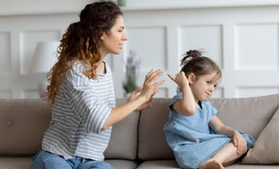
All young children occasionally exhibit mischievous, rebellious, and impulsive behaviour, which is quite natural. However, some kids exhibit exceptionally demanding behaviours that are out of character for their age group. Oppositional defiant disorder (ODD), conduct disorder (CD), and attention deficit hyperactivity disorder (ADHD) are the most prevalent conditions that cause disruptive behaviour. The diagnosis of these three behavioural disorders can be challenging and time-consuming because they have some similar symptoms. Emotional issues, mental disorders, interpersonal conflicts, and drug addiction can all be aggravating concerns.
Oppositional defiant disorder (ODD) is considered to affect one in ten children under the age of 12. Some ODD’s common behaviours includes: Agitation, frequently throwing tantrums, disputes regularly with adults, refuses to follow rules and appears to intentionally strive to irritate or enrage people, a low sense of self, low tolerance for frustration, tries to place the blame for any mistakes or wrongdoing on others.
Conduct disorder: Due to their delinquent behaviour and resistance to following rules, children with conduct disorder (CD) are frequently labelled as “bad kids.” A kid with CD may exhibit some of the following common behaviours: Recurring absences from class, lack of empathy for others, propensity to use substances, such as cigarettes and alcohol, from a young age, being hostile to people and animals, or engaging in cruel behaviour, such as bullying and physical or sexual abuse, willingness to initiate violent conflict, bringing weapons into physical conflict, regularly lying, stealing, setting fires on purpose, breaking into homes, and vandalism, a propensity to flee one’s home etc.
Ways to Manage Behavioural Issues
If you feel that your child is having few of the above problems, seeking assistance from a child psychologist or an online counsellor would be the first step you can take. Teaching parents how to interact with and look after their kids is one aspect of the typical comprehensive treatment that relies on the specific disease and variables that contribute to it.
Child psychologist through in-person therapy or online counselling can assist the youngster regulate their ideas and behaviour through cognitive behavioural therapy. Social training used by them can teach the kid crucial social abilities including how to interact with others and play nicely. A variety of coping mechanisms are taught to the youngster in order to diffuse their anger and violent behaviour, and they are also taught how to recognise the symptoms of developing irritation. Numerous youngsters with behavioural issues repeatedly struggle in both their academic and social connections. Online counsellor or a child psychologist helps in building self-esteem which can be aided by encouraging the youngster to succeed in their special abilities (such as sports).
However, there are methods you as parent may do to resolve a behaviour issue with your child:
- Connect with your child
You need to make sure that you and your child get along well before you consider how to handle the behaviour. Young children will be confused and upset if the connection is not going smoothly. They express their emotions through challenging behaviour. Therefore, spend a week making sure your child understands that he or she is loved and is likeable before you address the behaviour issue.
- Maintain eye contact and explain your request concisely and clearly.
Young children must not only hear what you say, but also comprehend it since they are learning a new language. If you speak to them on their level and provide clear instructions, it will assist. Along with telling them how, demonstrate it to them. Do it first with them. Also keep in mind that it takes time to learn new things.
- Be consistent so that kids understand the rules.
No parent is ever completely consistent, and they shouldn’t be. Whether someone is ill or exhausted, or when it’s a birthday or other special occasion, you may choose to act differently. To teach your children how to do something and then continue doing it that way is helpful since youngsters need to know what to expect in order to make sense of the world.
- Encourage their small wins
Observe when kids are performing well. We frequently spend so much time focusing on the huge things we desire from kids that we overlook and discourage the baby steps they take along the way. A young toddler learning to use the toilet, for instance, could wet the floor before telling you he has “done pee.” The ability to communicate with you is a necessary stage in toilet training, so if your child is successful in informing you about his actions after an accident, he will eventually be able to do so before it happens.
- Find out where the kids are.
As far as possible, behavioural issues should be avoided. Parenting requires physical labour. The likelihood is that your one-year-old will be experimenting with sketching on the sofa rather than the paper, despite your best efforts to make sure they are playing contentedly while you are doing something you enjoy. You must be aware of what they are doing in order to stop unintentional bad behaviour. Instead of hoping that your small kid would wait, try spending a few minutes including her in an activity before you begin your own assignment. It takes a lot longer to clean up the mess later.
- Be a model for them
Instead of what adults say, children learn the most from what they do. Therefore, if you decide that there should be no cursing, punching, or leaving clothes on the floor in your house, you must uphold the regulations yourself.